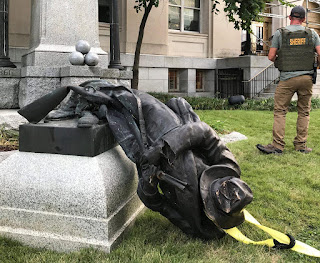


MSNBC, Washington Post----
(With 52 U.S. troop killed last month in Afghanistan, August was the deadliest month in the deadliest year yet in the Afghan war. NBC's Brian Williams reports.)
Visit msnbc.com for Breaking News, World News, and News about the Economy
KABUL - The commander of U.S. and NATO troops in Afghanistan called Monday for a new strategy against the Taliban in an assessment of the 8-year-old conflict, saying the situation is serious but victory was achievable.
NATO officials disclosed that Gen. Stanley McChrystal is expected to separately request more forces to fight an increasingly deadly insurgency.
Explosions killed two more U.S. troops, raising the record death toll in August to 47 — the deadliest month of the eight-year war for American forces.
Boosting the number of U.S. forces in Afghanistan is a hot-button issue that could ignite furious debate in Washington on the U.S. military's future in an increasingly unpopular war. Some Democratic senators have increased calls for a timeline to draw down troops.
McChrystal sent his strategic review of the Afghan war to the Pentagon and NATO headquarters Monday. U.S. Secretary of Defense Robert Gates ordered the 60-day review to size up the rapidly deteriorating security situation in Afghanistan as Taliban attacks rise and U.S. deaths spiral upward.
"The situation in Afghanistan is serious, but success is achievable and demands a revised implementation strategy, commitment and resolve, and increased unity of effort," McChrystal said in a statement Monday.
Request for more troops forthcoming?
A NATO statement said McChrystal's assessment seeks to implement President Barack Obama's strategy "to reduce the capability and will" of insurgents and extremists, including al-Qaida, and support the growth and development of Afghan security forces and Afghan governance.
McChrystal did not ask for more troops but is expected to do so in a separate request, two NATO officials told The Associated Press on condition of anonymity because they were not authorized to speak on the matter.
The United States already has some 62,000 troops in Afghanistan — a record number — and will have 68,000 by the end of the year. In total there are more than 100,000 U.S. and NATO troops in the country.
Thousands of U.S. forces moved into the Afghan south this summer after Obama ordered 21,000 more troops to the country this year,
forces who helped protect the country's Aug. 20 presidential election. McChrystal, who took over command in Afghanistan on June 15, delayed the release of the review so that it would not interfere with the vote.
Karzai leads vote tally
New vote tallies released Monday showed President Hamid Karzai with a strong lead over top challenger Abdullah Abdullah. Karzai had 45.8 percent of votes counted, while Abdullah had 33.2 percent. Ballots have been counted from almost half of the country's voting stations, meaning results could still change dramatically. Karzai will need 50 percent of the votes to avoid a two-man runoff.
Hundreds of allegations of fraud and voter intimidation threaten to mar the election, and female turnout was low. Voters who cast ballots faced retaliatory attacks from militants who told Afghans not to vote. Results are not expected to be finalized until mid- or late September, after officials work through the fraud allegations.
Extreme Danger
In an example of the extreme threats that voters faced, an Afghan man said Monday that Taliban militants cut off his nose and both ears as he tried to vote.
"I was on my way to a polling station when Taliban stopped me and searched me. They found my voter registration card," Lal Mohammad said from a hospital bed in Kabul. He said they cut off his nose and ears before beating him unconscious with a weapon.
"I regret that I went to vote," Mohammad said, crying and trying to hide his disfigured face. "What is the benefit of voting to me?"
Bolstering troop levels
The U.S. strategy in Afghanistan hinges on increasing the number of Afghan soldiers and police so U.S. forces can one day withdraw. Some 134,000 Afghan troops are to be trained by late 2011, but U.S. officials say that number will need to be greatly increased, an expansion that will be paid for by U.S. funds.
Afghanistan has long been seen as the "good" war by many in the United States, especially in comparison with U.S. efforts in Iraq, where U.S. troops are now drawing down. But some Democratic senators are beginning to question whether U.S. goals in Afghanistan are achievable, and when U.S. troops will be brought home.
Time to Get Out of Afghanistan
"Yesterday," reads the e-mail from Allen, a Marine in Afghanistan, "I gave blood because a Marine, while out on patrol, stepped on a [mine's] pressure plate and lost both legs." Then "another Marine with a bullet wound to the head was brought in. Both Marines died this morning."
"I'm sorry about the drama," writes Allen, an enthusiastic infantryman willing to die "so that each of you may grow old." He says: "I put everything in God's hands." And: "Semper Fi!"
Allen and others of America's finest are also in Washington's hands. This city should keep faith with them by rapidly reversing the trajectory of America's involvement in Afghanistan, where, says the Dutch commander of coalition forces in a southern province, walking through the region is "like walking through the Old Testament."
U.S. strategy -- protecting the population -- is increasingly troop-intensive while Americans are increasingly impatient about "deteriorating" (says Adm. Mike Mullen, chairman of the Joint Chiefs of Staff) conditions. The war already is nearly 50 percent longer than the combined U.S. involvements in two world wars, and NATO assistance is reluctant and often risible.
The U.S. strategy is "clear, hold and build." Clear? Taliban forces can evaporate and then return, confident that U.S. forces will forever be too few to hold gains. Hence nation-building would be impossible even if we knew how, and even if Afghanistan were not the second-worst place to try: The Brookings Institution ranks Somalia as the only nation with a weaker state.
Military historian Max Hastings says Kabul controls only about a third of the country -- "control" is an elastic concept -- and " 'our' Afghans may prove no more viable than were 'our' Vietnamese, the Saigon regime." Just 4,000 Marines are contesting control of Helmand province, which is the size of West Virginia. The New York Times reports a Helmand official saying he has only "police officers who steal and a small group of Afghan soldiers who say they are here for 'vacation.' " Afghanistan's $23 billion gross domestic product is the size of Boise's. Counterinsurgency doctrine teaches, not very helpfully, that development depends on security, and that security depends on development. Three-quarters of Afghanistan's poppy production for opium comes from Helmand. In what should be called Operation Sisyphus, U.S. officials are urging farmers to grow other crops. Endive, perhaps?
Even though violence exploded across Iraq after, and partly because of, three elections, Afghanistan's recent elections were called "crucial." To what? They came, they went, they altered no fundamentals, all of which militate against American "success," whatever that might mean. Creation of an effective central government? Afghanistan has never had one. U.S. Ambassador Karl Eikenberry hopes for a "renewal of trust" of the Afghan people in the government, but the Economist describes President Hamid Karzai's government -- his vice presidential running mate is a drug trafficker -- as so "inept, corrupt and predatory" that people sometimes yearn for restoration of the warlords, "who were less venal and less brutal than Mr. Karzai's lot."
Mullen speaks of combating Afghanistan's "culture of poverty." But that took decades in just a few square miles of the South Bronx. Gen. Stanley McChrystal, the U.S. commander in Afghanistan, thinks jobs programs and local government services might entice many "accidental guerrillas" to leave the Taliban. But before launching New Deal 2.0 in Afghanistan, the Obama administration should ask itself: If U.S. forces are there to prevent reestablishment of al-Qaeda bases -- evidently there are none now -- must there be nation-building invasions of Somalia, Yemen and other sovereignty vacuums?
U.S. forces are being increased by 21,000, to 68,000, bringing the coalition total to 110,000. About 9,000 are from Britain, where support for the war is waning. Counterinsurgency theory concerning the time and the ratio of forces required to protect the population indicates that, nationwide, Afghanistan would need hundreds of thousands of coalition troops, perhaps for a decade or more. That is inconceivable.
So, instead, forces should be substantially reduced to serve a comprehensively revised policy: America should do only what can be done from offshore, using intelligence, drones, cruise missiles, airstrikes and small, potent Special Forces units, concentrating on the porous 1,500-mile border with Pakistan, a nation that actually matters.
Genius, said de Gaulle, recalling Bismarck's decision to halt German forces short of Paris in 1870, sometimes consists of knowing when to stop. Genius is not required to recognize that in Afghanistan, when means now, before more American valor, such as Allen's, is squandered.
View Larger Map
Sources: MSNBC, Washington Post, Huffington Post, Google Maps




































































.jpg)























No comments:
Post a Comment